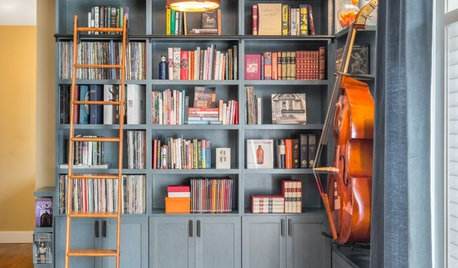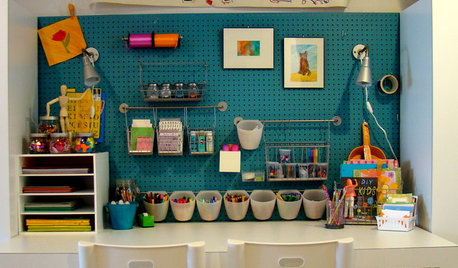Learning to play a musical instrument?
lucillle
3 years ago
last modified: 3 years ago
Related Stories

I Spy: Musical Instruments Around the House
Compose a Great Space With the Shapes and Promise of Music
Full Story
KIDS’ SPACESBoy’s Bedroom Is a Colorful Place for Music, Learning and Fun
Bold hues, custom artwork and a corner where a 7-year-old can rock out on the drums add up to a cool bedroom hangout
Full Story
LIVING ROOMSThese Spaces Have the Music in Them
See 10 rooms where people jam with friends, learn new instruments, display rock art, listen, compose and perform
Full Story
HOUZZ TOURSMy Houzz: A Musical Couple's Home Strikes a Personal Chord
Light, glass and many musical instruments animate this 1905 bucolic Washington farmhouse
Full Story
DECORATING GUIDES6 Multifunctional Rooms That Work and Play Hard
Dining, working, playing music, crafting, laundry, opera singing and even juggling are accommodated in these multipurpose spaces
Full Story
KIDS’ SPACESHow to Create a Play Area That Looks Good Too
Learn 10 ways to give your kids' playspace some style without sacrificing any of the fun
Full Story
DECORATING GUIDESDecorating for Children: How Your House Can Support Creative Play
When you encourage kids to use their imagination, you help them learn problem solving, relationship building and creativity
Full Story
DECORATING GUIDES9 Lessons We Can Learn From Drawing Rooms
Let these formal rooms inspire you to create entertaining spaces that encourage conversation, music and games
Full Story
THE ART OF ARCHITECTURESound Advice for Designing a Home Music Studio
How to unleash your inner guitar hero without antagonizing the neighbors
Full Story
ARCHITECTURETune In to the Music of Architecture
Great buildings and interiors can bring music to mind, having rhythm and style and inspiring a range of experiences. See how the two relate
Full Story


OutsidePlaying
Elmer J Fudd
Related Discussions
Music instruments you play at camp/trail
Q
Need Musical Notes/Instruments Afghan ideas...
Q
Any musicians out there, who decorate with musical instruments?
Q
Thursday's Trivia Quiz
Q
bpath
foodonastump
Elmer J Fudd
OutsidePlaying
Annegriet
eld6161
bpath
Elmer J Fudd
bpath
H B
bragu_DSM 5
Elmer J Fudd
Yayagal
eld6161
bpath
lucillleOriginal Author
Elmer J Fudd
Zalco/bring back Sophie!